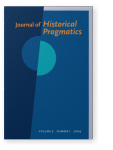Vol. 5:1 (2004) ► pp.27–47
Triglossia and pragmatic variety choice in nineteenth-century Bruges
A case study in historical sociolinguistics
This article deals with the roles and functions of dialect, Dutch and French for Flemish upper class writers in the 19th century.
It argues against the common opinion that the linguistic situation at that time in Flanders can be characterized by rigid dichotomies such as formal French versus informal dialectal/regional Dutch, and/or upper class French versus middle and lower class (dialectal) Dutch.
Analyses of original upper class documents from various archives in the town of Bruges lead to the assertion that the actual choices between the available linguistic resources were to a considerable extent dependent on contextual and pragmatic considerations. Examples taken from town council records, high society correspondence and election propaganda will illustrate the close link between variety choice and the wish to include/exclude certain social groups in distinct communicative settings.
Cited by
Cited by 8 other publications
This list is based on CrossRef data as of 4 july 2024. Please note that it may not be complete. Sources presented here have been supplied by the respective publishers. Any errors therein should be reported to them.
